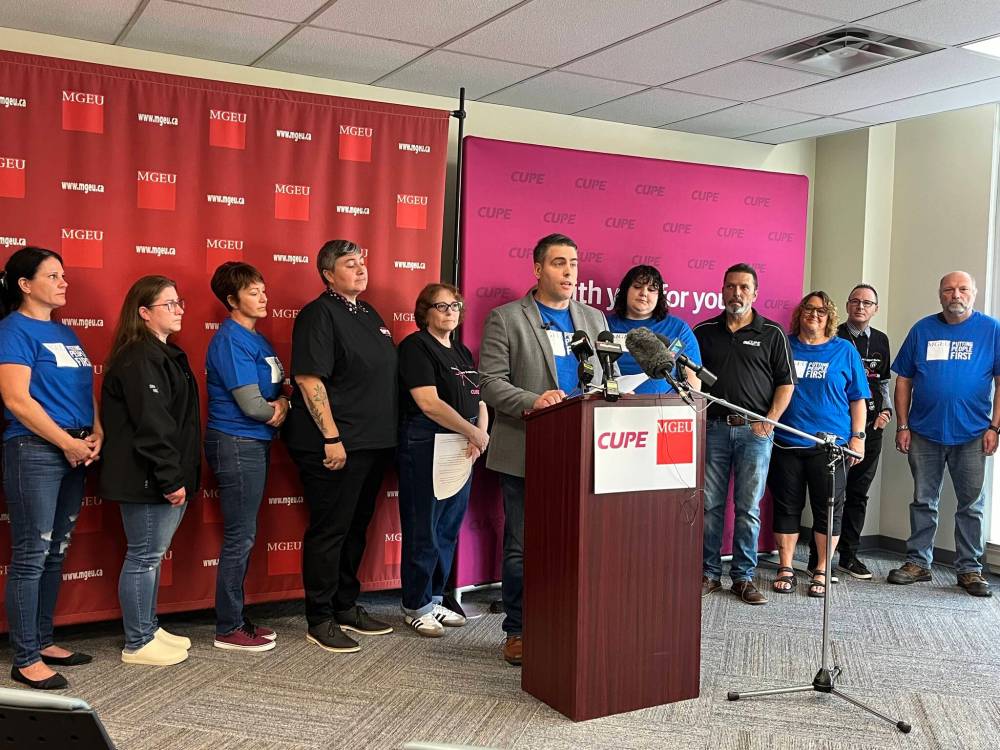Health authorities across much of Manitoba are making contingency plans for home care and other services in case contract negotiations fail and thousands of support workers go on strike Tuesday.
Interlake-Eastern Regional Health Authority warned Monday some services could be delayed or cancelled, or wait times could increase, amid looming job action by community and facility support staff.
Essential services must continue, but they will be reduced.

Manitoba Government and General Employees’ Union president Kyle Ross announced Tuesday as a potential strike date during a news conference in Winnipeg last month. (Malak Abas / Free Press files)
“While planning is ongoing to limit disruption to patients, residents and clients, any work stoppage is likely to have an impact on health services,” IERHA wrote on its website.
“For appointments and clinical activities that do proceed, patients can expect delays. We ask for your patience as our staff do their best to care for you and thank you for your understanding.”
IERHA said home-care services and some clinic appointments could be “significantly disrupted” if a strike occurs.
Primary health-care clinics, hospital services, diagnostics and emergency department services will be “maintained,” but they could be affected by some delays, IERHA said.
Last month, more than 25,000 health-care workers, represented by the Canadian Union of Public Employees Local 204 and the Manitoba Government and General Employees’ Union, set Tuesday as a strike date.
These staff work at hospitals and personal-care homes, and in the provincial home-care program. They include health-care aides, laundry workers, dietary aides, ward clerks, recreation co-ordinators and people who work in maintenance and housekeeping.
Conciliation continued Monday in an attempt to reach a tentative deal and avert a strike. The process involves a neutral third party to mediate issues at the bargaining table.
The unions are negotiating with Shared Health, the Winnipeg Regional Health Authority, IERHA, Prairie Mountain Health and Southern Health. Northern Health is the only region not included in contract talks.
The unions are seeking an improved offer on wage increases.
A number of support worker positions start at just above minimum wage, or about $17 per hour for many, making them lower paid than their counterparts elsewhere in Canada, the unions said.
MGEU and CUPE members rejected previous contract offers.
The deal for MGEU members included a one per cent wage increase retroactive to April 1, and an 11.25 per cent wage hike spread over the four years of the contract.
On Sunday, the unions said they were nowhere near reaching a deal.
“We have been bargaining all weekend with the assistance of a conciliator in the hopes of reaching a fair settlement and averting a strike,” CUPE Manitoba president Gina McKay and MGEU president Kyle Ross said in a joint statement.
“Unfortunately, bargaining is not going well. We remain far from an agreement, but we will continue to bargain.”
Provincial legislation requires essential health services, including priority home care, to continue when a strike occurs. It was unclear how many of the 25,000-plus union members will be required to report to work each day to carry out essential services.
MGEU has said a strike would result in a roughly 30 per cent reduction in home-care services, a 25 to 30 per cent drop in work by clerical staff and a five to 10 per cent cut in work by health-care aides.
In the event of a strike, picket lines will be set up outside some health-care facilities.
“There are set understood protocols though in place with respect to patient, client, family and medical transportation access to IERHA sites for services related to site informational picketing during a strike — we are fully confident these will be followed,” IERHA said.
“The IERHA respects the collective bargaining process and the right to strike. More importantly, we also fully value our employees and look forward to an eventual new collective agreement and then moving forward together to continue to serve.”
Last week, Shared Health warned that community health services, particularly home-care services, and some clinic appointments could be significantly disrupted.
The authority said changes, delays or cancellations of some services are possible. Some tasks deemed to be of a lower priority could be offered less frequently or postponed.
chris.kitching@freepress.mb.ca

Chris Kitching
Reporter
Chris Kitching is a general assignment reporter at the Free Press. He began his newspaper career in 2001, with stops in Winnipeg, Toronto and London, England, along the way. After returning to Winnipeg, he joined the Free Press in 2021, and now covers a little bit of everything for the newspaper. Read more about Chris.
Every piece of reporting Chris produces is reviewed by an editing team before it is posted online or published in print — part of the Free Press‘s tradition, since 1872, of producing reliable independent journalism. Read more about Free Press’s history and mandate, and learn how our newsroom operates.
Our newsroom depends on a growing audience of readers to power our journalism. If you are not a paid reader, please consider becoming a subscriber.
Our newsroom depends on its audience of readers to power our journalism. Thank you for your support.